ALSO BY KAREN CASEY
It's Up to You: A Practice to Change Your Life by Changing Your Mind
Be Who You Want to Be: Dealing with Life's Ups And Downs
Serenity
All We Have Is All We Need
Change Your Mind and Your Life Will Follow: 12 Simple Principles
Fearless Relationships: Simple Rules for Lifelong Contentment
Each Day a New Beginning Journal Book
Girl to Girl: Finding Our Voices
Keepers of the Wisdom: Reflections from Lives Well Lived
Daily Meditations for Practicing the Course
A Woman's Spirit: Daily Meditations for Women
A Life of My Own: Meditations on Hope and Acceptance
In God's Care
Worthy of Love
If Only I Could Quit: Recovering from Nicotine Addiction
The Promise of a New Day: A Book of Daily Meditations
Each Day a New Beginning: Daily Meditations For Women

First published in 2008 by Conari Press,
an imprint of Red Wheel/Weiser, LLC
With offices at:
500 Third Street, Suite 230
San Francisco, CA 94107
www.redwheelweiser.com
Use of the Twelve Steps is by permission of Alcoholics Anonymous World Services, Inc. Copyright 2008 by Karen Casey. All rights reserved. No part of this publication may be reproduced or transmitted in any form or by any means, electronic or mechanical, including photocopying, recording, or by any information storage and retrieval system, without permission in writing from Red Wheel/Weiser, LLC. Reviewers may quote brief passages.
ISBN: 978-1-57324-362-9
Library of Congress Cataloging-in-Publication Data available upon request.
Cover and text design by  theBookDesigners | bookdesigners.com.
theBookDesigners | bookdesigners.com.
Typeset in Adobe Caslon Pro.
Cover art  theBookDesigners | bookdesigners.com.
theBookDesigners | bookdesigners.com.
Printed in Canada
TCP
10 9 8 7 6 5 4 3 2 1
The paper used in this publication meets the minimum requirements of the American National Standard for Information SciencesPermanence of Paper for Printed Library Materials Z39.48-1992 (R1997).
CONTENTS

We can take charge of our own lives, not the lives of other people.
A Life of My Own
PREFACE
T HE CONCEPT OF DETACHMENT is one I have reckoned with for more years than I care to count. I had no idea as a youngster that my constant fear, which manifested as daily stomachaches and frequent vomiting, was due to my inability to detach from the scowls or scoldings, real or imagined, I frequently got from my parents. From a very young age, I was a master at reading the facial expressions and body language of other people. I needed to know how someone else was feeling in order to know if I was acceptable, loved, worthwhile, or at fault for their bad mood. I lived in fear of frowns and scolding when I was small. Not looking at other people around me would have meant I had no idea who I was or what I needed to do.
I didn't know if other kids my age ever felt like I felt. I was too afraid to ask them. I wasn't even able to ask my three siblings how they felt about the tension in our home. I simply remember that we all remained quiet and escaped to the bedroom when my dad got mad, which was soon after he got home from work most evenings.
Anger was, without a doubt, the prevalent emotion in our house. My father's expression of it was frequent and loud, and it scared me. I used to watch my mother to see if she felt the same fear that I did. She generally looked down or away when he ranted. Sometimes she went to the bathroom and cried. She seldom confronted my father's anger. But when she did, his rage only worsened. I used to be afraid friends would come over or call while he was yelling. I didn't want them to hear him curse so vehemently. I thought they might tell their parents, whom I had seldom heard curse, and they wouldn't be able to come to my house anymore.
There didn't seem to be any one thing that made my father mad. Minor infractionslike one of us leaving his evening paper in a disorganized pile or forgetting a bike in the drivewayresulted in major outbursts and spankings. My father wasn't always physically abusive while angry, but my brother and I did feel the pain of his hand often enough.
My siblings and I carried the emotional scars of our childhood into our other relationships as we got older because we didn't know any other way of functioning. Our scars manifested in obvious, though very different, ways. My oldest sister developed panic attacks. Sister number two has struggled with being overweight for most of her adult life. My brother had a full-blown nervous breakdown in his early twenties. He has been emotionally stuck in an unchallenging career ever since. I think I am the lucky one. I turned to alcohol and drugs and men to mask the pain of supposed unworthiness, and I eventually got the emotional and spiritual help I needed through the fellowship of Alcoholics Anonymous (AA) and Al-Anon.
Gathering the information to write this book has been an intensely absorbing undertaking. I had not thought a great deal about my own childhood for a number of years. Through a series of efforts, thousands of Twelve Step meetings, hundred of sessions with sponsors, hours and hours of prayer and meditation, and my willingness to see the past in a different light, I have finally been able to leave it behind. However, to do justice to the topic of detachment, I needed to recall what it was like, what happened, and what it's like now, as we say in AA meetings. And I can say with absolute resolve that I will not choose to repeat the pain of my past.
I have learned how to make a different choice when I am tempted to let the behavior of others determine what my next act will be. I hope that what I share in this book will help you understand that you, too, can make a different choice if you find yourself repeatedly caught in unproductive, unrewarding, unloving exchanges with the significant people in your life.
INTRODUCTION
I STILL VIVIDLY recall when I first read Why Am I Afraid to Tell You Who I Am? by John Powell. When I got to page thirty-eight, I was stunned to read a description of my most common response to the behavior of the significant people in my life. Powell was walking down a New York City street with his journalist friend, Sidney Harris. They stopped at a newspaper vendor's shack to pick up the morning edition. The vendor was an extremely unpleasant man who not only ignored Harris when he said good morning, but also didn't thank him when Harris told him to keep the change. Powell immediately asked his friend why he was so kind and generous to such an ungrateful, mean-spirited individual. Harris replied, Why should I let him decide what kind of day I am going to have?
I realized at that moment that I had spent my entire life letting the actions or words or mere glances of others trigger my behavior, my feelings, my attitude, my self-assessment, and thus my plan for each day, as well as my imagined future. And I had never realized it. It simply had not occurred to me that I could or should be the one to decide exactly who I would bring to the party every day of my life.
How others act does not need to affect how we think or act. There are countless situations and people we have no control over. A friend's angry outburst, a motorist's failure to see our car in a busy intersection, a spouse's relapse into alcohol or drug useall of these things may upset us. But that upset can be brief if we keep the power over our own feelings.
Next page
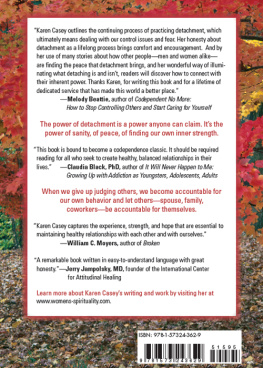
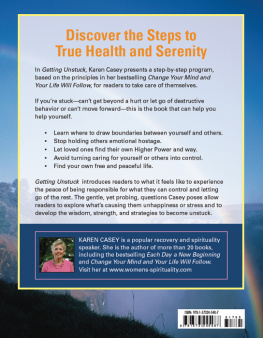

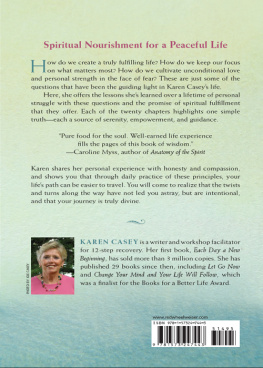
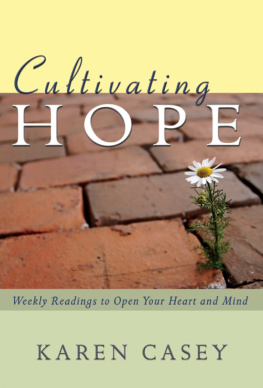
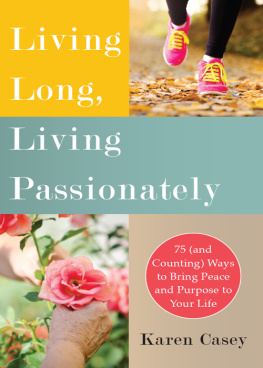

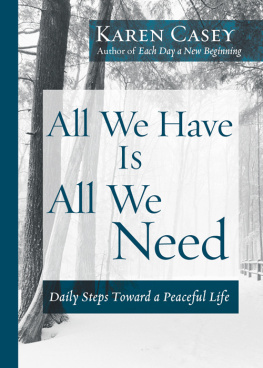
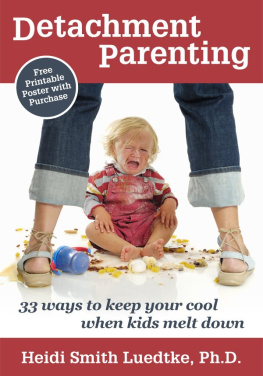
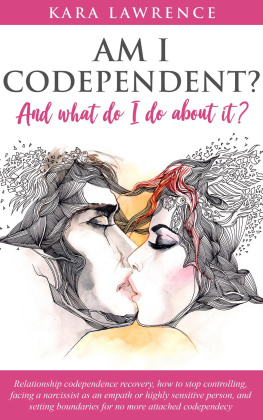
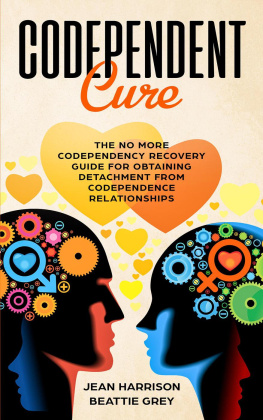
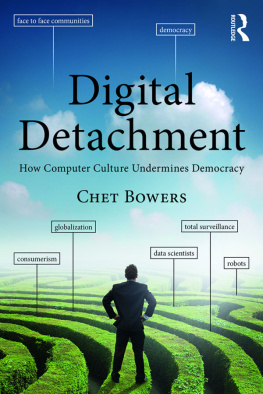
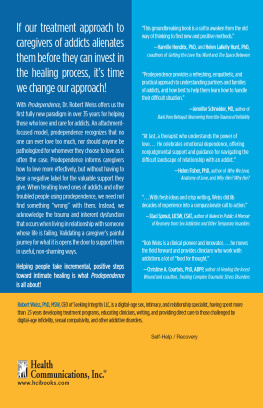

 theBookDesigners | bookdesigners.com.
theBookDesigners | bookdesigners.com.